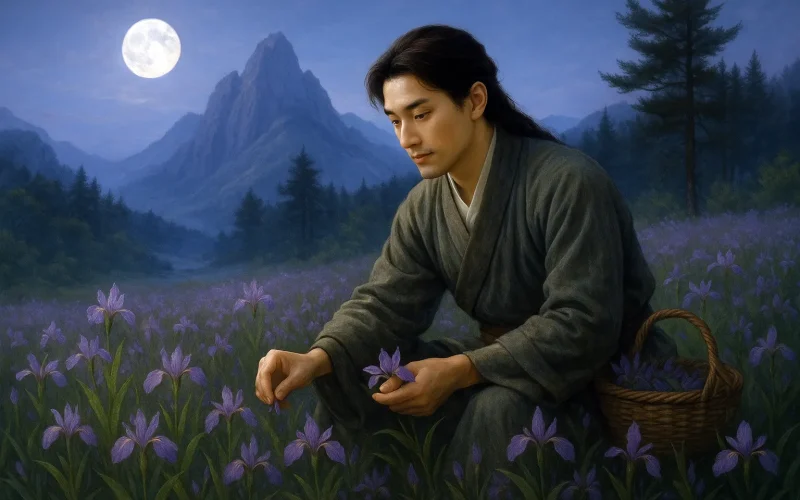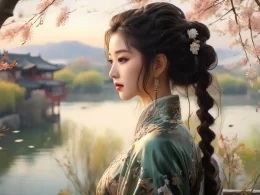The mist is deep and the waters wide;
No messenger can go e’en with the tide.
There’s only the moon beyond the cloud
Shining upon our longing vain.
All day I sigh for parting pain;
My sorrow’s locked like brows in vain.
I leave half of my bed at night
For you to come back in dream’s flight.
Original Poem
「清平乐 · 烟深水阔」
李白
烟深水阔,音信无由达。
唯有碧天云外月,偏照悬悬离别。
尽日感事伤怀,愁眉似锁难开。
夜夜长留半被,待君魂梦归来。
Interpretation
Though its authorship is uncertain—attributed either to Li Bai or to a poet from the Five Dynasties to early Song period—this ci poem demonstrates mature artistic technique. With subtle and refined brushstrokes, it portrays a pining woman's incessant longing and sorrow amid misty waters and severed communication. Through environmental ambiance, imagery evocation, and detailed depiction, the poem progressively reveals the character's inner solitude and steadfast hope.
First Couplet: "烟深水阔,音信无由达。"
Yān shēn shuǐ kuò, yīn xìn wú yóu dá.
Mist lies deep, waters stretch wide; No word can make its way through.
The opening establishes the poem's tone with vast natural imagery. "Deep mist, wide waters" constructs an immense, blurred space—both a real geographical barrier and the psychological landscape of despair. "No word can make its way" resolutely seals off any realistic communication, placing the protagonist in absolute isolation.
Second Couplet: "唯有碧天云外月,偏照悬悬离别。"
Wéi yǒu bì tiān yún wài yuè, piān zhào xuán xuán lí bié.
There’s only the moon beyond the cloud. Shining upon our longing vain.
In this hopeless reality, the poet's gaze turns skyward. The moon, a shared witness across distances and a conventional symbol of longing, here takes on a tinge of complaint with "偏偏" (inexplicably)—why must it illuminate the pain of separation like a heartless reminder? "悬悬" (suspended) describes both the distance of parting and the anxious, unsettled state of a heart constantly yearning.
Third Couplet: "尽日感事伤怀,愁眉似锁难开。"
Jìn rì gǎn shì shāng huái, chóu méi sì suǒ nán kāi.
All day, dwelling on matters, nursing sorrow; My sad brows lock like a bolt, hard to open.
This couplet turns inward, directly depicting the protagonist's state. "All day" conveys the enduring nature of the sorrow; "dwelling on matters, nursing sorrow" is its content. "Sad brows lock like a bolt" is an exquisite metaphor, materializing intangible inner grief into a tangible, external lock, vividly expressing its depth and inescapability.
Fourth Couplet: "夜夜长留半被,待君魂梦归来。"
Yè yè cháng liú bàn bèi, dài jūn hún mèng guī lái.
Night after night, leaving half the quilt long empty, Awaiting your spirit's return in dream.
This line represents the emotional climax, intensifying longing to its utmost through an intimate domestic detail. "Reserving half the quilt" embodies a silent act of waiting and perseverance, symbolizing enduring hope. "Awaiting your spirit's return in dream" becomes the ultimate refuge in an illusory realm when physical reunion remains impossible. This transition from the tangible (the half-empty quilt) to the intangible (dream reunion) poignantly captures the complex interplay between desperate devotion and profound despair.
Holistic Appreciation
The poem demonstrates masterful structural composition. The opening stanza progresses from expansive natural imagery ("mist and water") to more intimate focus ("the overarching moon"), establishing a cosmic backdrop for the sorrow. The second stanza transitions temporally from diurnal grief ("all day sorrow") to nocturnal anticipation ("night after night waiting"), delving deeper into the protagonist's psychological state. This emotional arc moves logically from the despair of physical separation, through the melancholy of passing time, to the fragile hope of dream-reunion—each layer intensifying the poetic impact. Such artistic accomplishment anticipates the nuanced subtlety that would characterize later wanyue(subtle and restrained) cipoetry.
Artistic Merits
- Fusion of Scene and Emotion: Elements like "misty water" and the "moon" are not just natural scenery but direct externalizations of the inner state, blending feeling and scene into one.
- Expressive Power of Detail: Details like "sad brows lock" and "leaving half the quilt"—one depicting the form of sorrow, the other its depth—show more than words could say.
- Lyrical Shift from Real to Unreal: Moving from the realistic "no word can get through," to reliance on the "beyond the clouds moon," finally seeking a "spirit's return in dream," completes a leap from the real world to psychological space and then to the dream realm, expanding the dimensions of emotional expression.
- Concise Diction with Profound Meaning: The poem employs precise word choice; terms such as "悬悬" (suspended), "偏偏" (inexplicably), and "长留" (deliberately reserving) appear simple yet carry deep emotional weight, conveying complex feelings through subtle implication.
Insights
This poem portrays an emotional resilience that persists even in despair. It reveals the emotional constraints faced by women in ancient societal structures—while their world was often confined, they guarded their feelings with remarkable depth and purity. The symbolic act of "leaving half the quilt empty" demonstrates that love transcends mere possession, sometimes manifesting as a ritualistic waiting that affirms both commitment and identity. In our modern era of instant communication, this profound emotional experience born of distance and anticipation remains a poignant and valuable aspect of human connection, reminding us to cherish accessible reunions and present-moment communication.
About the poet

Li Bai (李白), 701 - 762 A.D., whose ancestral home was in Gansu, was preceded by Li Guang, a general of the Han Dynasty. Tang poetry is one of the brightest constellations in the history of Chinese literature, and one of the brightest stars is Li Bai.












